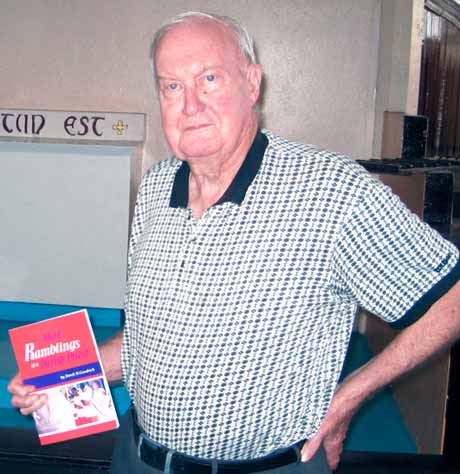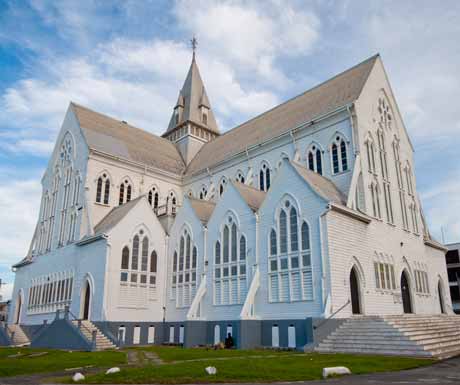Book Review
Guyana adventures
Dynamics Graphics, 2004, pp.111.

A review by Frank Birbalsingh
More Ramblings of a Parish Priest is the extended version of an earlier account, first written by the author in 1993, about his experience as an Anglican priest in Guyana. As retired Major General Joseph Singh writes in his "Foreword" to the rather slender volume: "More Ramblings is an excellent recall of Reverend Goodrich's tour of duty in Guyana … in that period [1970s-1990s] of significant constitutional and social changes." With the example of a committed church family behind him - his grandfather, two uncles and a cousin on his father's side all being Anglican priests - it is perhaps not surprising that young Derek Goodrich who was born in London in 1927 and read history at Cambridge University starting in 1945, should forge ahead with studies for the Ministry and the General Ordination Examination before being ordained Deacon by the Bishop of London, in 1952, and Priest in St. Paul's Cathedral, London, in 1953.
After serving his Title at St. Andrew's Church in Willesden Green, in London from 1953 to 1957, Reverend Goodrich's initiation into Guyana's church, culture and society began with a six-month acting post as Priest-in-Charge of St. Phillips Church in the capital city Georgetown, in 1957, when he encountered a society with a population about 50 percent of whom were Christian, 40 percent Hindu, and 10 percent Muslim, a multiracial mix of ethnic Africans, Indians, Chinese, Portuguese, nine indigenous Amerindian tribes, and a language that officially may have been English but, for many of his parishioners, was a local - Guyanese - variant of creole speech. Yet, after settling into his

As Reverend Goodrich suggests, the coming of Independence that transformed larger English-speaking Caribbean territories from British colonies into new nations in the 1960s also inspired a transformation of leadership in the West Indian Anglican church which consisted of: "one province made up of eight Dioceses, stretching from Belize in central America through the English-speaking islands of the Caribbean to Guyana in the American mainland." For while, until Independence, Anglican Bishops were white: "a natural move" now appeared "towards having nationals in leadership positions," so that Cuthbert Woodroffe, Bishop of the Windward Islands, was able to succeed Archibishop Alan John Knight, an Englishman, as Archibishop of the West Indies.
Nor did Reverend Goodrich fail to observe political change in Guyana, after the 1960s, when Forbes Burnham's socialist People's National Congress (PNC) sneaked into power through an unlikely coalition with Peter D'Aguiar's business-oriented United Force (UF), which was designed to deny power to Dr. Cheddi Jagan's People's Progressive Party (PPP) in elections, in 1964, by adopting the American-inspired voting strategy of proportional representation. As it turned out though, after getting rid of D'Aguiar in 1968, Burnham retained power by rigging all subsequent elections. During the long Burnham regime that ensued, while Reverend Goodrich admits that the PNC made economic progress, for example, in the early 1970s, by building roads, he notes: "the power-drunkenness of many politicians, the growing corruption in the society and the increasing emigration of many of our most capable people. All this led to our decline economically and morally." Reverend Goodrich refers to this period as: "a difficult one in church/State relationships" and claims that, by 1976: "the PNC had infiltrated the Guyana Council of Churches and there was an attempt to de-emphasise religion." He also recalls an incident when members of the House of Israel: "the strong-arm backup to the PNC …blocked the entrance to the Diocesan Youth Centre and prevented me and others from attending the annual meeting of the Guyana Council of Churches."
Despite the absorbing interest of these political observations, however, More Ramblings is principally a record of the author's experience as a Churchman in Guyana when faced with: "the basic pattern of Mass, Offices, prayers, study etc." together with a daily routine of: "sermons and addresses to prepare (often over two hundred a year), registers to complete, accounts to be brought up to date, visits from numerous people, perhaps seeking a testimonial or baptismal certificate or arranging a marriage or planning a funeral," not to mention home and hospital visits, Confirmation classes, even blessing mini-buses." This is not complaining about overwork. Documentation of his intensive routine simply confirms Reverend Goodrich's self-confessed reputation as a workaholic, while his good humour in warning mini-bus drivers that: "my blessing stops at 55 m.p.h." also confirms genuine relish of his time in Guyana.
In the end, More Ramblings emerges more as a memoir than an autobiography, for although it is chronological, and includes accounts of Reverend Goodrich's extensive travels and walking tours in many countries, together with brief information about his family – he is an only child, for instance, and never married – his book remains a loose and leisurely recollection of his adventures (ramblings) as a parish priest rather than a consistent analysis of his growth or development. As he writes: "I was always a parish priest. For me that was the best job in the world." and he is aware of divine guidance when drawn, many times, to visit a home with real need. He also acknowledges: "the blessing of living and working in a multi-ethnic society." All this suggests that Reverend Goodrich did not simply preach the gospel, but achieved what is far more difficult: he practised what he preached!